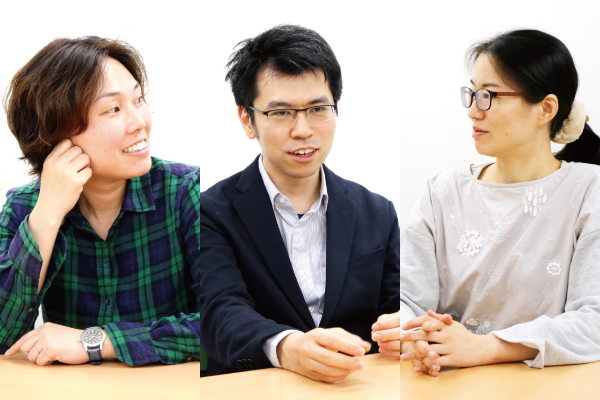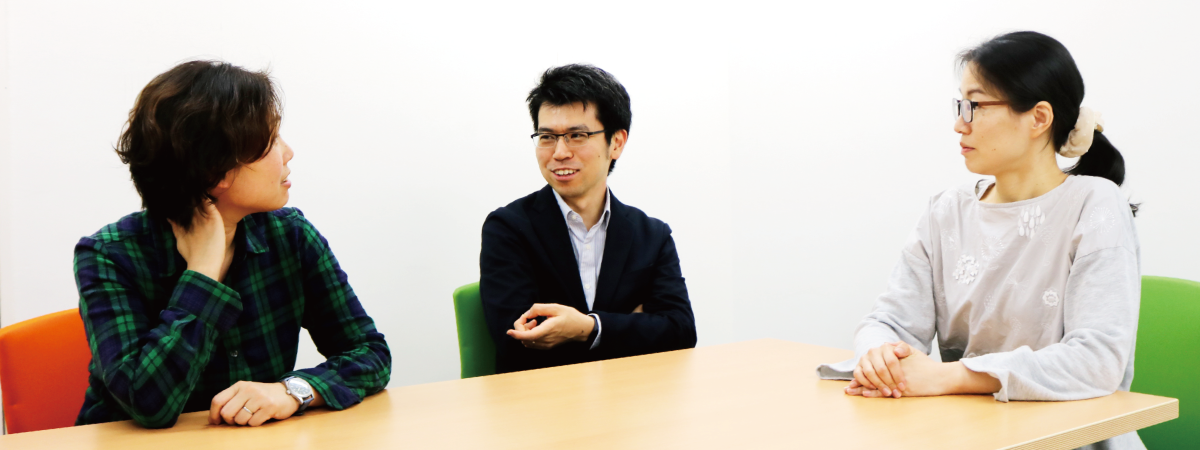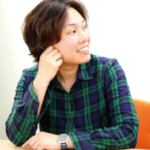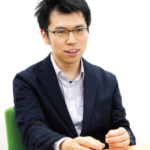- Announcements for middle and high school students
- Information for Middle and High School Researchers
- Information for Teachers
I asked the person inside, "What is the Science Castle's goal for the future?"
2020.03.03

Nine years after its launch, Science Castle finally seems to be entering its next stage.
But what's the next stage?
With this in mind, we urgently convened the key members of the team. With this in mind, we decided to secretly ask them what kind of evolution Science Castle will achieve in the future.
(Listener: Takuro Sano)

Satomi Maeda(Satomi Maehara)Ph.
Area of expertise: Human Factors Psychology, Ergonomics, Psychology
D., he returned to Japan and joined LIVERNESS. D., he returned to Japan and joined LIVERNESS. He believes that "don't be afraid to say what's on your mind and just do it" will expand his world. He is one of the too-global human resources and is trying to promote collaboration with overseas junior and senior high school researchers. Currently, he is working as a researcher atDirector, Center for Education and ResearchHe has served as a

Tetsushi Nishiyama(Satoshi Nishiyama) Doctor of Science
Specialty: Molecular biology, developmental engineering
D. in research on mitochondrial diseases. For many years, he led the Research and Development Division at LIVANES as the head of the department. He is always thinking about research. Currently, he is the head of the Education Development Division. He has an uncontrollable passion for "Science Castle," a conference for junior high and high school students.

Tomoko Tachibana(Satoko Tachibana) Master (Life Sciences)
Specialty: Microalgae
He was studying the starch stored by microalgae. He believes that research begins with "heat. He has gathered many passionate researchers around himself and has been working to pass on their enthusiasm to junior and senior researchers. Currently, he is working as a researcher atDirector, Research and Career CenterHe will also serve as a
What is "science"?
Sano:The name "Science Castle," to begin with.What is Science?
Maeda:To systematically elucidate unknown phenomena with a universal method and language... This includes the perspective of research, but I guess it goes something like this.
Nishiyama:It is a difficult question, isn't it? It is both a discipline and a way of thinking. It's like, "How do we perceive the world?
Rikka:Would you say it is a truth that exists opposite to human beings?
Maeda:In the first place, science may be a product of human creation. It is a product of our interest in things around us other than humans....
Sano:That's a higher level answer than I expected.(Sweat). Does research mean pursuing such incomprehensible events on a daily basis?
Define research.
Rikka:One gets the impression that "doing research" is something special, but to begin with, defining research is difficult. For example, a toddler may throw a rock or drop something off a desk and stare at it. For a small child, that might be like research, too.
Nishiyama:When you think about it,Research is instinctive.Maybe it is. There seems to be a theory that children's activities, as Tachibana-san says, are "learning about cause and effect. Maybe it is a human instinct that we enjoy learning about cause and effect, right?
Rikka:In that sense, anyone can be considered a researcher. For example, a craftsman who is trying to make a better product at a local factory is also a researcher from a different perspective.We all do research every day.So.
Sano:I see. So you are saying that there is very little so-called academic research and a lot of other research.
Maeda:Yes, I agree. However, it can be said that the research conducted by the participants in Science Castle is similar to academic research, so they are expected to follow certain rules and manners in terms of using methods and language that are common throughout the world.
What is the value of academic research?
Sano:For academic researchWhat value is there?
Maeda:Research is an activity that expands the knowledge of mankind through the use of numbers and diagrams to describe phenomena that are still unknown, and I believe it is a noble and truly valuable activity.
Nishiyama:For example, individuals who work on a single topic may have individual motivations, such as because they like research, want to be useful, or want to get rich. I, for example, do research simply because it is "fun. It is fun to formulate a hypothesis and work on it. I also enjoy the process of discovery.
On the other hand, since each individual has different interests, research themes naturally diversify. In fact, in society,It is important that diverse research is conductedIt may be.
Sano:In other words, is there value in the fact that various studies are being done?
Nishiyama:On the other hand, if everyone in the world was working in the same direction, there would be no other increase in knowledge. As time passes, its value may disappear. Just like the evolution of living organisms, the diversity of things we have allows us to continue to create new knowledge and value even as times continue to change.
To integrate diverse research themes
Rikka:I know there are many different areas of research that will be presented at the Science Castle.
Maeda:Indeed, Science Castle has a "presentation space". However, there is still something missing, though.
Sano:Quite frankly,What Science Castle is missingWhat does that mean?
Maeda:At the Science Castle, various studies will be presented. However, the results obtained fromNew value is created when knowledge is fused together.The Science Castle has not yet reached the point where it can be used as an opportunity to promote the development of new products and services. That is, in the wake of the Science Castle,Collaboration among junior and senior high school student researchersWhat are some examples of how you are working on new hypotheses and themes?Still low.That is to say.
Sano:I see. But from what I have heard so far, it seems that the research itself is not easy, and it takes courage to involve other researchers.
Nishiyama:Indeed, it may take courage to approach a stranger researcher. However, it is a great learning experience to share not only the results of your research, but also how you arrived at the theme and the process that led to this research plan. Why did you think this way, why did you conceive of this?Start with a discussionmight be a good idea.
The Real Significance of Research Presentations
Sano:Science Castle, a place to present research, allows for face-to-face discussions, but on the other hand, there is another way to present research: papers, right?
Nishiyama:Yes, I am sure it is. It may indeed be meaningful to publish a valuable discovery as a paper, tell the world about it, and leave it for future generations. However, on the contraryGetting published in a journal is not the only thing that matters.I also think that the "dissertation" system was created by people, and I question whether it is up to date. The "paper" system was also created by people, and there is the question of whether it is appropriate for the times. It is possible that this system of "thesis" has given rise to a value system in which the first person to publish is basically the greatest. In this way, research is becoming more and more closed because it is easier to maintain a competitive advantage by not revealing the content of the research until a dramatic discovery is made.
Of course, that doesn't mean it's wrong, but it doesn't mean it's right for every study either.
For example,If the research is aimed at solving a problem.I am not concerned about making it my own accomplishment,It's far more valuable to work on a theme and share information together.Maybe.
A paradigm shift in research value that can be achieved by middle and high school student researchers.
Rikka:Speaking of challenges, Asia, India, Africa, etc., more than JapanOverseas, there are more challenges.I have a feeling thatThe following is a list of the most common problems with the
Maeda:Especially from the perspective of problem solving, the idea of opening up research information seems valid, and I hope to do so. However, it may be difficult for those who have interests involved to accept it.
At the same time, many of the challenges we face around the world are becoming more difficult to solve as their factors become more complex.One person can't make it happen.We will need to get together with a lot of people and bring their wisdom to the table. Many friends will need to get together and bring their wisdom to solve the problem. Nowadays, theThe nature of science and research itself needs to be developed.It may be.
Sano:I am concerned about the language barrier when trying to form a team with people from overseas to conduct research.
Maeda:For researchers, the common goal of pursuing science is enough of a catalyst to build a team, even if it is junior high and high school students. For example, the story of the Japanese high school student researchers who participated in the Singapore competition, they want their own research to be known and they want opinions and reactions, so they try their best to communicate their research even if their English is not good. Singaporean high school students and researchers are also interested in what kind of research they are doing, so they try their best to listen to and understand what they have to say.Language and cultural barriers are not a surprise.It is a thing. Nowadays, communication and translation technologies have advanced to the point where we can easily communicate with people overseas.
Nishiyama:Research, of course, will not be able to ignore its connection to economic activities. But it can also be said that we are in an age in which we cannot demonstrate the value of research if we are bound by interests. I believe that middle and high school student researchers who are not bound by these default concepts are the ones who can pursue a new way of being in science and research.
And Science Castle is the place where we can change those values.
